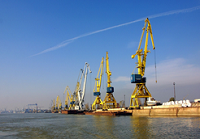Energy savings in port industry

Investor
Port Bazinul Nou

Location
Galati, Romania

Investment
Replacement of two electricity consuming anchor cranes with one diesel-powered unit

Investment Size
€309,000

Energy savings
73%

Donor
EU

Replacement of two old cranes increases flexibility of operations
Port Bazinul Nou at the Danube River has the area of around 335,000 square meters and is connected to all European countries though its water links, railroads and motorways, capable of processing both standard and oversized cargoes.
To improve the production process, as well as to decrease its production costs, including energy costs, the company decided to replace two electric floating cranes (anchored cranes) with a modern diesel-powered ‘Sennebogen Manipulator’.
The company addressed EEFF for affordable financing for the project and advisory assistance.
The EEFF team assessed the investment measures, in particular, the potential for energy savings, profitability and effect, as well as the environmental aspects.
The loan of €309,000 allowed the company to decrease its energy consumption by 73 per cent, translated into substantial cost savings each year. In addition, the new equipment resulted in increased operational flexibility. The investment will be repaid from energy savings very fast, leaving the positive cash-flow for many more years to follow. This project increased the company’s efficiency and financial standing, improving the business attractiveness.
This project demonstrates that replacement of any production equipment leads to energy savings and other benefits, translated into increased margins and profits. In addition, this is possible in all sectors of economy and all types of companies. Therefore, it is worth checking the energy saving potential of possible investment measures to choose the most profitable and attractive ones.
This way, EEFF supports implementation of energy efficiency and renewable energy projects by private sector. Together, the private, residential, and public sectors can make a change in the energy consumption patterns and environmental protection.



